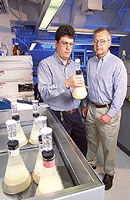![]()
The folks at the American Wind Energy Association remind you that Monday, April 9th is the deadline to sign up for early registration for the Wind Power 2007 Conference and Exhibition, June 3-6 in Los Angeles, CA.
Organizers promise the latest industry trends and information with more than 50 educational sessions featuring the new Scientific Track:
WINDPOWER 2007 Highlights:
Pre-Conference Seminars:
– Fundamentals of Wind Energy (specifically created for those who are new to the wind industry or want to brush up on some basics)
– Wind Development 201 (what makes a successful wind project – building on the Fundamentals of Wind Energy)
– Personal Wind Systems for Homes, Farms, and Small Businesses (bringing small wind turbine technology to mainstream customers)
Conference Program:
– Several General Sessions including “Growing the Wind Energy Business” and “Utility Leadership in Wind Development” as well as a Welcome and Opening Session featuring political leaders.
– Session Tracks – For the first time this year, WINDPOWER 2007 will feature 5 separate tracks of sessions from Monday to Wednesday. The Business and Technical tracks span all 3 days, but each day will also feature shorter tracks including Policy, Utility, Project Development (NEW), Small Wind, Scientific (NEW), and Global View (NEW).
– Poster Reception – the Poster Session will be held on Sunday, June 3 from 5:30 – 6:30 pm directly before the Opening Reception in the exhibit hall. Over 160 poster presentations will be featured at this reception where attendees can interact directly with the poster authors.
– First Time Attendee Orientation – New! For those of you who have never attended WINDPOWER before, a new orientation session on Sunday afternoon will help you make the most out of your experience plus meet the AWEA Staff and Board of Directors.
More than 350 exhibitors are already confirmed and more are expected by the June conference.
Click here for registration and more information.
 Officials in Monroe County, New York are working with High Falls Brewery on a plan to turn beer waste into ethanol and produce enough of it to power much of the county’s fleet of vehicles. If all goes well, the county hopes to have extra available to offer ethanol-based fuel to the public.
Officials in Monroe County, New York are working with High Falls Brewery on a plan to turn beer waste into ethanol and produce enough of it to power much of the county’s fleet of vehicles. If all goes well, the county hopes to have extra available to offer ethanol-based fuel to the public.

 USDA Agricultural Research Service scientists at the Eastern Regional Research Center in Wyndmoor, Pa., are investigating ways to avoid overburdening the corn market as ethanol production expands.
USDA Agricultural Research Service scientists at the Eastern Regional Research Center in Wyndmoor, Pa., are investigating ways to avoid overburdening the corn market as ethanol production expands. As New Hampshire’s state legislature moves forward a proposal to study biodiesel production, distribution, and promotion in the state, the first commercial biodiesel plant is proposed.
As New Hampshire’s state legislature moves forward a proposal to study biodiesel production, distribution, and promotion in the state, the first commercial biodiesel plant is proposed. This week, the
This week, the  Ethanol company Aventine Renewable Energy Holdings Inc., will continue to market ethanol for Granite Falls Energy LLC, of Minnesota.
Ethanol company Aventine Renewable Energy Holdings Inc., will continue to market ethanol for Granite Falls Energy LLC, of Minnesota.